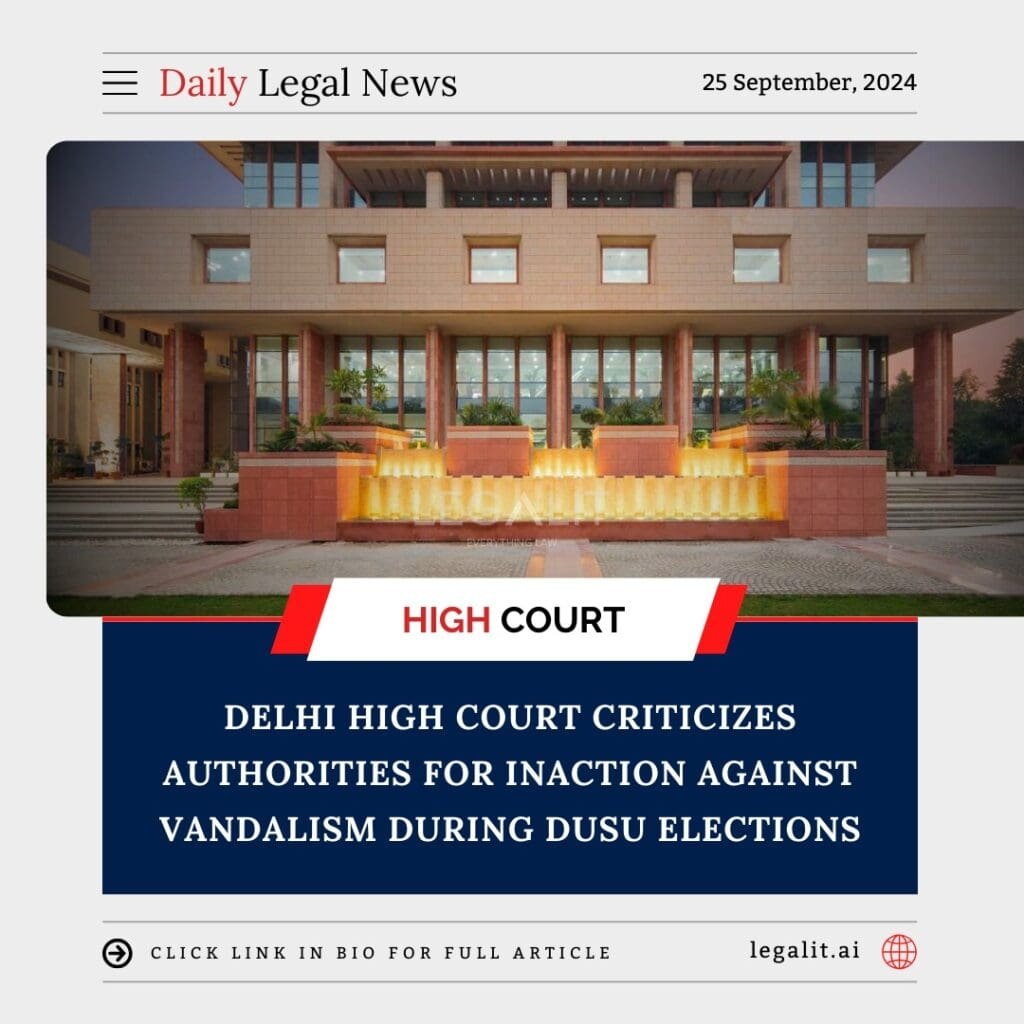
The Delhi High Court has reprimanded the city authorities for their failure to curb incidents of vandalism and maintain law and order during the Delhi University Students’ Union (DUSU) elections. The court expressed its dissatisfaction over the lack of effective measures to prevent property damage and ensure peaceful campaigning during the student body elections.
1. Vandalism During DUSU Elections
The DUSU elections, known for their high-energy campaigning, have often been marred by vandalism, with supporters of different candidates defacing public property, walls, and infrastructure with posters and graffiti. In the latest election cycle, these activities reached alarming levels, leading to public outcry and legal intervention. Complaints were raised about the destruction of both public and private property, raising concerns over the authorities’ failure to enforce regulations and hold perpetrators accountable.
2. Court’s Concern Over Law and Order
During the hearing, the Delhi High Court pulled up municipal authorities and law enforcement for their apparent inaction in addressing the widespread vandalism. The court criticized the lack of a proactive approach to maintaining law and order during the election period, despite clear evidence of damage to public property.
The bench pointed out that elections should not serve as an excuse for lawlessness and emphasized that the authorities have a duty to ensure that campaigns are conducted in a peaceful, lawful manner. The court warned that failure to act on these issues sends a negative message to both students and the general public, encouraging a culture of impunity.
3. Impact of Vandalism on Public Property
The defacement of public property during the DUSU elections has long been a point of contention. Every election season, public walls, flyovers, and even metro stations become canvases for political posters and slogans. This widespread defacement not only impacts the aesthetics of the city but also incurs significant costs in terms of cleaning and restoration.
The court expressed concern over the repeated disregard for laws that prohibit defacement of property and questioned why authorities have not taken stronger steps to prevent such activities. The bench also highlighted that vandalism contributes to a negative image of student politics and undermines the democratic process.
4. Authorities’ Lack of Action
The High Court pointed out that despite the visible violations, there was no concrete action from the city’s municipal corporations or the police to prevent or punish acts of vandalism. The court noted that the authorities have been given the necessary legal tools to curb such behavior but have failed to utilize them effectively.
The court further questioned whether any fines or penalties had been imposed on those responsible for the damage and whether any legal action had been taken against offenders. The absence of strong deterrent measures was cited as one of the reasons for the recurrence of these incidents.
5. Court’s Directions
In its ruling, the Delhi High Court directed the municipal corporations and police to take immediate steps to enforce anti-vandalism laws and ensure that any damage to public property is promptly addressed. The court also called for a detailed report on the actions taken by the authorities to prevent vandalism during the election and the efforts made to penalize those involved.
The bench urged authorities to adopt stricter oversight during future election cycles, including deploying additional personnel and installing surveillance measures to monitor public spaces. Furthermore, the court advised election candidates and their supporters to engage in responsible campaigning and respect public property.
6. Significance of the Ruling
The High Court’s strong stance on the issue reflects a broader concern about maintaining the rule of law during democratic processes, including student elections. The DUSU elections, while a significant platform for student leadership, have often been plagued by unruly behavior, and the court’s intervention is a step toward restoring order and accountability.
This ruling also emphasizes the need for civic responsibility among election candidates and their supporters, urging them to prioritize peaceful and lawful campaigning practices. By holding authorities accountable, the court aims to foster a culture of accountability and respect for public property in future elections.
7. Conclusion: A Call for Action and Responsibility
The Delhi High Court’s criticism of authorities for their failure to act against vandalism during the DUSU elections serves as a stern reminder of the need for proactive governance and law enforcement. As elections are a fundamental aspect of democracy, the court’s intervention highlights the importance of ensuring that these processes are conducted within the boundaries of law and order.
The authorities have been called upon to implement stricter measures to curb vandalism, while students and political groups are encouraged to take responsibility for their actions and uphold the principles of peaceful campaigning. The court’s directive is expected to pave the way for better-regulated elections in the future, preserving both democratic integrity and the sanctity of public property.
[ajax_laod_more]